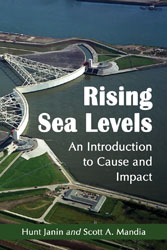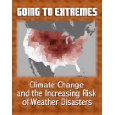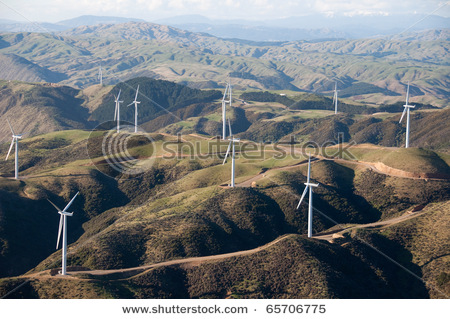 Of all the consequences of human-caused global warming, sea level rise has always held special alarm for me in its inexorability, its extension into the future, and the enormous disruption it threatens to centres of high population and essential infrastructure. Scientist Scott Mandia (blog) and writer Hunt Janin have teamed to produce for the general reader an explanation of what it will mean for the world in coming decades and beyond. Their book Rising Sea Levels: An Introduction to Cause and Impact is patient and restrained in its survey, but no less sobering for that. Their coverage leaves no doubt as to the magnitude and extent of the measures that will have to be taken to try to cope with the effects of sea level rise as it gathers momentum and extent.
Of all the consequences of human-caused global warming, sea level rise has always held special alarm for me in its inexorability, its extension into the future, and the enormous disruption it threatens to centres of high population and essential infrastructure. Scientist Scott Mandia (blog) and writer Hunt Janin have teamed to produce for the general reader an explanation of what it will mean for the world in coming decades and beyond. Their book Rising Sea Levels: An Introduction to Cause and Impact is patient and restrained in its survey, but no less sobering for that. Their coverage leaves no doubt as to the magnitude and extent of the measures that will have to be taken to try to cope with the effects of sea level rise as it gathers momentum and extent.
The authors don’t expect much in the way of mitigation of climate change by international agreement to limit emissions. Indeed, they take it for granted that emissions are going to continue to rise and that international agreement will continue to founder on obdurate differences between political blocks which negotiators appear unable to resolve even in the face of such a threat as global warming. Presumably one day the common danger will become so overwhelming as to force international agreement, but the authors see no such early likelihood and certainly not in time to forestall metres of sea level rise. The book is not about preventing sea level rise but about preparing for it and adjusting to it.


 Greenwash: Big Brands and Carbon Scams by
Greenwash: Big Brands and Carbon Scams by  Amidst the scarcely believable frenzy of climate change denial which has taken hold in sectors of American politics, to say nothing of the equally scarcely believable silence from the White House, we need to be reminded that there are sane and steady political voices in that country, however difficult it is for them currently to gain a hearing. Representatives Edward Markey and Henry Waxman recently had the minority staffs of the Committee on Natural Resources and the Committee on Energy and Commerce prepare a report for them Going to Extremes: Climate Change and the Increasing Risk of Weather Disasters (pdf
Amidst the scarcely believable frenzy of climate change denial which has taken hold in sectors of American politics, to say nothing of the equally scarcely believable silence from the White House, we need to be reminded that there are sane and steady political voices in that country, however difficult it is for them currently to gain a hearing. Representatives Edward Markey and Henry Waxman recently had the minority staffs of the Committee on Natural Resources and the Committee on Energy and Commerce prepare a report for them Going to Extremes: Climate Change and the Increasing Risk of Weather Disasters (pdf  Writing in the latest newsletter from the
Writing in the latest newsletter from the